- Home
- Alexandra Bracken
Brightly Woven
Brightly Woven Read online
FOR MY PARENTS,
DAN AND CYNDI,
WHO HAVE THEIR OWN
GREAT LOVE STORY
Contents
Title Page
Dedication
Map
Chapter One
Chapter Two
Chapter Three
Chapter Four
Chapter Five
Chapter Six
Chapter Seven
Chapter Eight
Chapter Nine
Chapter Ten
Chapter Eleven
Chapter Twelve
Chapter Thirteen
Chapter Fourteen
Chapter Fifteen
Chapter Sixteen
Chapter Seventeen
Chapter Eighteen
Chapter Nineteen
Epilogue
Acknowledgments
About the Author
Copyright
CHAPTER ONE
The day the rains finally came was like any other, with blistering air coating the canyon in a heavy stillness. By late afternoon, the only thing more suffocating than the air was the dust kicked up by our feet. We were as quiet as the dead, moving from rock to crevice, always watching the paths for a sign of movement. Not even a desert hare emerged from the shade. In a way, we were grateful to be left alone, but it was a haunting reminder of what waited for us in the valley below: a village of deserted streets, of wood and mud houses, and of the slow, creaking swing of the well’s empty pail.
I crouched beneath the cover of the jutting rocks, my legs aching with exhaustion and my chest as tight as dry leather. The dust was hot between my fingers, and my knees stung with all the jagged little rocks that dug into them. I was awful at this game—I was awful when I was a kid and still awful now, years later, when Henry had decided that the best way to watch his little brothers was to play go-seek-find.
Even with all of the hiding places the Sasinou Mountains had to offer, none ever seemed good enough to mask the red hair that grew out of my head in every which way. I wasn’t exactly an image of grace and lightness of foot, either, which made hiding more difficult.
Earlier that day, Mother had given us a disgusted face when Henry came to our house, begging me to join them in the mountains. For weeks, she had worn the strip of black cloth like armor, knotting it fiercely around her upper arm every morning in the dark since the news had reached Father by post.
“Out playing games—now, of all times? It’ll do nothing more than show the young ones how to be disrespectful,” she had said, working a slab of dough on the countertop. I gripped the silver pendant around my neck and held my tongue.
Mother and the others her age had grown up with the king. They remembered his early ascension to the throne, his many years of pushing Auster’s forces from our shores, and had admired him for his fair rule. Three years prior, when the king had married the young, beautiful Eglantine, the entire country celebrated the wedding. To everyone my age, he was only a face on a portrait. To our parents, he had been a hero.
“The king’s been buried for a month,” Henry said gently.
“A month and already forgotten,” she said. “Never thinking of what will become of us, now that the dear old man is gone. The queen is far too young to rule.”
Henry and I shared a look. All of the adults had uttered the same line at one point or another. My father had called a village meeting the night he had received the terrible news. Parents had filed into the great hall, where they remained all night, away from the prying ears of children. The queen was a sore subject with my parents. “Too young,” my mother said. “Too inexperienced,” my father added. “Her world is her wardrobe.”
All of this was true. Eglantine was only a few years older than I. She had married a man old enough to be her father and had earned only scorn from the people when she failed to produce an heir to the throne.
The next morning, our parents all emerged from the meeting with the same pale strained look. A pact had been made. We young people knew that that single letter announcing the king’s death had done more to shake the roots of our village than our ten-year drought.
At the time, Henry and I were sure that the adults were only worried about Queen Eglantine neglecting the western villages. The king had taken a special interest in our region and had offered the use of the Wizard Guard’s finest wizards to try to coax the rain out of the clouds. When that had proved futile, he set up a peaceful trade of water between Saldorra, an otherwise hostile country, and us, the town of Cliffton, in the country of Palmarta. Our yellow dirt, when mixed with water, could be fired into the hardest ceramics the world had ever seen. Our sand was the only currency we had.
My mother turned to Henry. “I know that you at least have better things to do with your time.”
“We’re done salvaging the corn,” Henry said. “There isn’t much to go around, but Father said it should last at least a month. I’ve finished my chores, and Father and I won’t leave to make the mud deliveries until tomorrow morning.”
My mother stopped kneading, her hands releasing the battered dough. She glanced up through the small window that overlooked our bit of land.
“Sydelle, did you start the rug for Mrs. Anders?”
I nodded, my eyes drifting back to the loom leaning against the wall. All Mrs. Anders wanted was a yellow rug to help hide the dust tracked into her rickety little home. I would be done in a day, maybe two.
“All right, but take the basket and bring back some dry root. I need to grind a new batch for your father after you ruined the last of it with your clumsy hands.”
Henry said, “We’ll find enough to last for the next few months, I promise.”
And then, amazingly, she let us go.
Three hours later, I was crouched down behind the rocks until my knees were shaking with pain. Just as I was about to launch myself forward, Henry appeared beside me, grinning like a kid. I let out a small, surprised squeak. He held a finger to his lips.
I thought, not for the first time that day, that something was a bit off. We hadn’t had this heavy a cloud cover in years, and Henry’s tan skin and brown hair were looking especially dulled in the unusual dimmed light. He faded easily back into the mountains, while my pale skin, burned pink by the sun, made my efforts to hide all the more difficult.
He crawled past me, sticking his head out to gauge whether his brothers were still around.
“I think I lost them a ways back,” he said. “Ready?”
“Why do I have to go first?” I complained. “You always make me go first—ever since we were ten.”
“And six years later,” he whispered back, “I still like you enough to give you the glory of the capture, Sydelle Mirabil. Don’t forget we have our honor to uphold.”
“You mean your honor,” I said. “Against your six-year-old brothers. If one of those scamps hits me with a rock, you’re taking my chores for a week.”
Henry glanced out one more time and nodded. I sprang forward, heading for the scrap of fabric tied to the trunk of the hollow tree. Henry was right behind me, his long legs carrying him quickly across the small path. Above us, we heard the cries of the twins and the thudding of the rocks they launched in our direction. Demons.
Something did hit me. Something wet, which might have been sweat had it not been so cool. It rolled down the back of my neck, nearly jolting me from my skin. At first, I didn’t recognize it for what it was. It had been years, truly years.
I whirled around to face Henry, to see if he had felt it, too. He was staring up into the sky, his eyes wide. The twins launched one last rock from the cliffs overhead. It fell inches from my feet, but I didn’t move. There was a moment of absolute silence before the thunder cracked and the sky opened.
> We were drenched in a moment. The rain fell from the sky in heavy, fat drops. I let out a choked sound, half delight, half surprise. Henry and I stared at each other, holding our breaths for fear it would be over just as quickly as it had begun. We had been six, maybe seven at the last rain, but the twins hadn’t been born yet. They looked up at the sky, and it was clear by the looks on their faces that they were mystified.
“Come on!” Henry said, turning to run. “Allan! John! Back to the village.”
“My basket!” I said.
“Get it later,” Henry insisted.
“I’ll meet you down there,” I said. “Just go—you have to watch your brothers.”
The twins charged down the steep trail and passed right by us. We could hear shouts from the valley below, the village waking from its long, dry slumber.
Henry gave me a long look. Was he honestly worried I would get lost? I watched the rain smear the dust on his cheeks into long, snaking lines and smiled. That was just the kind of friend he was, ready to fall over himself with concern.
“Go!” I said, giving him a playful push. We turned away from each other at the same moment, he back toward the village, barely visible through the sheet of rain. I was heading up, to the highest point of the canyon.
It had been raining for less than a minute, and already the dust had melted into patches of sticky mud. The raindrops were fat and unrelenting—a feast after a ten-year famine.
I stumbled over the loose rocks, but I never stopped, not even for a moment. I wanted to be in the village, to hear the songs and prayers of thanks. To see the look on my mother’s face, and the weight lifted from my father’s shoulders. Each raindrop was sending up a little splatter of dust, and I had never seen the dirt so dark as it was in that moment. The cracked, withered soil seemed to melt together beneath my feet.
When the men from Saldorra came to trade their water for our dirt, I thought, wouldn’t they be surprised at what they found?
The scent of rain and dust was dizzyingly wonderful, and I wished for a bottle to capture it. A new carpet practically wove itself in my mind, and I could see how to bring the blues together with the silvers and browns. I could almost imagine what the village would look like spotted with green. We wouldn’t be forced to work so hard, every single day. The possibilities were freeing beyond my wildest dreams.
I found my basket right where I had left it, where the sun could dry the roots that Henry and his brothers had helped me pull from the ground. They were a soggy mess, but I didn’t think my mother would mind.
I wrapped my arms around the basket, holding it closely to my chest, breathing deeply. I would stay up here a little while longer, where only the rain could touch me.
Suddenly I could hear voices rising from below even with the fierce pattering of rain against the rocks. Only they were not raised in joy, they were shouts coming in a different tongue.
I pushed the wet hair off my cheeks and was to the ledge in three short steps, bracing my basket against my hip.
There were horses and men in the field just beyond the mountain, hundreds of them. Their scarlet uniforms were a blur from my vantage point, a long, twisting line of men and beasts.
My eyes drifted along the river of red, twisting down the pass. Behind the first group of horses were wagons, their wheels now trapped in the yellow mud. It looked as if the soldiers behind them were pushing vainly as the horses struggled to pull them free.
They weren’t bringing in the usual trade of water.
I took a step back, colliding with something solid, my startled cry muffled by a hand. I was pulled away from the ledge, spinning toward the overhang of rock.
“Don’t scream,” someone said in my ear. “I’m going to let you go, but don’t scream, all right?”
I nodded, holding my basket tightly.
The man let me go without a moment’s hesitation. I whirled around, the basket coming up to smack the side of his face. He staggered back, but before I could bolt past him, he had me by the arm again, and this time his grip wasn’t as forgiving.
“What are you doing here?” he asked. I kept my eyes diverted, looking for a way to escape, to overpower him. He wouldn’t let me; he hauled me around and pinned me there. The happiness in my heart was entirely gone, replaced by fear.
The stranger wasn’t dressed in a Saldorran uniform as I would have expected a scout to be, but in simple clothes. He looked to be about my age, maybe a few years older. I watched the rain drip down the length of his long nose and collect in his dark, uncombed hair. There was a small cut on his face where the sharp edge of my basket had caught his skin, but it was nothing compared to the bruise on his other cheek.
I let myself admit that he had a roguish charm about him. Some hint of softness in his eyes, at least. No, he wasn’t a soldier, but he was still a stranger, a vagabond, maybe. Even if I hadn’t seen his face, his worn boots and torn cloak would have told his story. The pressure of his hand on my arm became nearly unbearable, yet it wasn’t until I let out a gasp of pain that he released me.
“Are you from the village?” His words came out in an urgent rush. “From Cliffton?”
I nodded. “Why are the soldiers here? Do you have any idea why—?”
“Can you take me to the elder?”
“My father?” At that, I did take a step back.
“Is he in the village now?” I wasn’t sure how to respond, and he must have been able to tell. He took my arm again, this time far more gently. “You can trust me—I’m here to help you. Is your father in the village, or has he left for the capital?”
The sound of horses and men below drifted in and out of my ears. I searched for a reason to distrust him, but instead I saw the desperation in his face, the real concern.
He had a kind face, even with the dirt, even with his wounds.
“Yes,” I said finally. “He is. I can take you to him.”
He took my other arm, pulling me toward him so quickly the basket slipped from my hands. It was the last sound that reached my ears, for in the next moment even the rain disappeared. The man brought his black cloak up around us, pulling me close to him. The world spun away under our feet. I felt my stomach lurch and an explosion of pain behind my eyes, and just as quickly, darkness fell over us.
I woke, not in the yellow mud of the mountains, but in the dark chill of my room, under a pile of blankets. Somehow, the afternoon had fallen into night without my knowing it. If the slow growl of thunder and the steady pattering of rain hadn’t been there to greet me as I opened my eyes, the entire day might have been a dream.
How had I gotten down from the pass? I had slipped and knocked my head against the rocks before, but never so badly as to lose all recollection of it. And the stranger, what about him?
“Sydelle, are you awake?” Mother whispered. I turned my head and allowed the dizziness to wash over me. The usual rasp in her voice was gone.
“What’s happened?” I asked, waiting for my eyes to adjust to the darkness. She held a candle up to her face, its flickering light catching the strands of her pale hair. I saw that my loom had been disassembled and moved from the main room of the house into my cramped room.
“That man I met in the mountains—is he here?”
There was sadness in her eyes where I had expected to find anger. I didn’t know whether to be relieved or frightened by it.
“I’m sorry about the roots,” I said quickly. “When the rain clears, I’ll find more.”
She brought the candle closer to my face, and for the first time, the warmth it provided was a relief. My hair and dress were still damp, and the rain had cooled the air enough for me to shiver beneath the blankets.
“I’ll go tell your father you’re awake,” she said. “He’s with our guest.”
My mother left without another word, leaving me alone, my questions still unanswered. I sat up slowly, wishing she had left the candle with me. All I could make out in the darkness was my loom and the shape of my father’s leather
bag next to it on the floor. It looked full. What had the man asked—if my father had left for the capital yet?
“…would you…Sydelle…it’s…”
The words came in soft fragments. I strained my ears past the slow drumming of rain to the conversation on the other side of the wall. Layers of mud and plaster muffled the voices, but the stranger’s rich voice was clear, almost as if he was in my room.
“…from the capital?” asked my father.
“No, but I have spent a great amount of time there,” the stranger replied after a long pause.
“Just how old are you, Mr….?”
“North,” the man said, neatly sidestepping my father’s question. “Wayland North, if you’d prefer.”
“What are you doing around our parts?” Mr. Porter, Henry’s father, asked. I hadn’t realized he was there. “It’s unusual to find a wizard so far west, given that we’re so close to Saldorra and they don’t take kindly to your…kind.”
A wizard, I thought numbly. The word rolled around inside of me. That man had been a wizard, one of Astraea’s disciples…and I had been so disrespectful. Had he brought the rain?
“After the king was murdered, some of the details didn’t align for me,” said the wizard. “I needed proof, so I traveled west.”
I pressed my ear up against the wall.
“We were told the poison came from Auster. Are you saying that it came from Saldorra?” my father asked. His voice was too calm—I almost couldn’t hear it above the pounding in my ears. Poison? Henry and I had guessed an illness, an accident perhaps…but murder…?
Wayland North let out a sharp laugh. “I have it on good authority that the wizards haven’t the slightest idea where the poison came from. They only know it was put in his nightly glass of wine.”

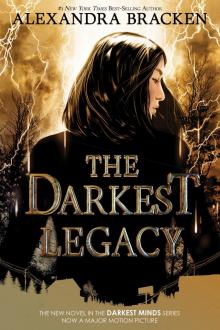 The Darkest Legacy
The Darkest Legacy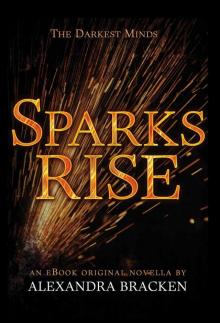 Sparks Rise
Sparks Rise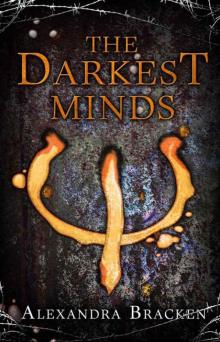 The Darkest Minds
The Darkest Minds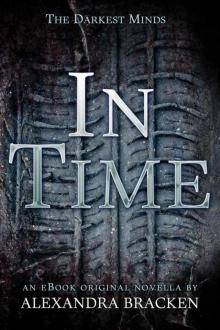 In Time
In Time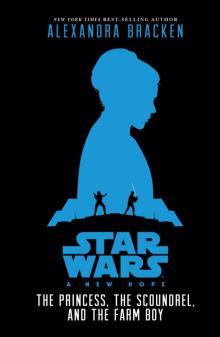 Star Wars: New Hope: The Princess, the Scoundrel, and the Farm Boy: Being the Story of Luke Skywalker, Darth Vader, and the Rise of the Rebellion (Novel)
Star Wars: New Hope: The Princess, the Scoundrel, and the Farm Boy: Being the Story of Luke Skywalker, Darth Vader, and the Rise of the Rebellion (Novel) Brightly Woven
Brightly Woven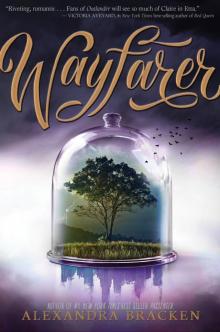 Wayfarer
Wayfarer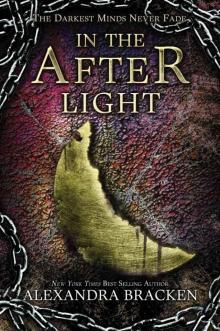 In the Afterlight
In the Afterlight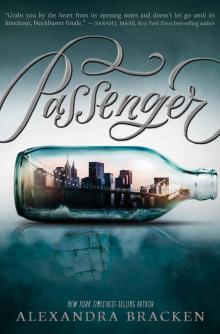 Passenger
Passenger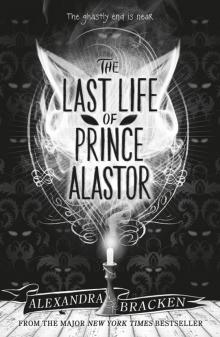 Prosper Redding: The Last Life of Prince Alastor
Prosper Redding: The Last Life of Prince Alastor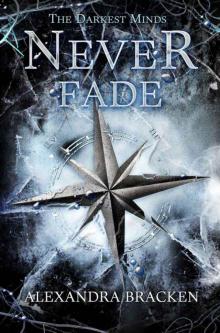 Never Fade
Never Fade Lore
Lore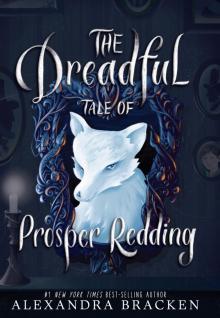 The Dreadful Tale of Prosper Redding
The Dreadful Tale of Prosper Redding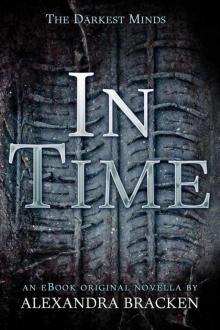 The Darkest Minds: In Time
The Darkest Minds: In Time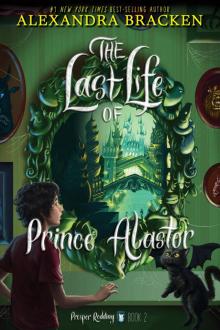 The Last Life of Prince Alastor
The Last Life of Prince Alastor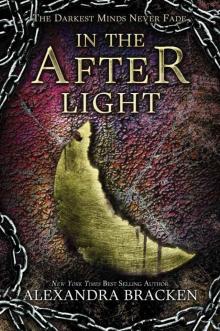 In the Afterlight (The Darkest Minds series)
In the Afterlight (The Darkest Minds series)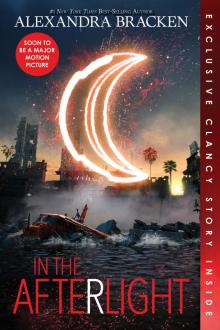 In the Afterlight (Bonus Content)
In the Afterlight (Bonus Content)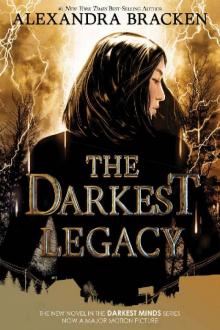 The Darkest Legacy (Darkest Minds Novel, A)
The Darkest Legacy (Darkest Minds Novel, A)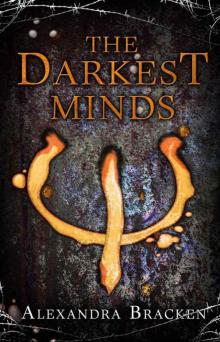 Darkest Minds (1) The Darkest Minds
Darkest Minds (1) The Darkest Minds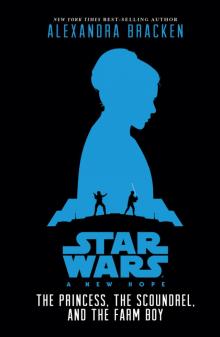 The Princess, the Scoundrel, and the Farm Boy
The Princess, the Scoundrel, and the Farm Boy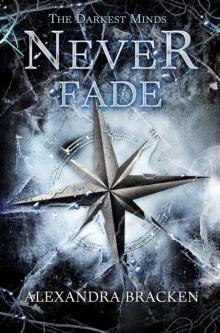 Never Fade tdm-2
Never Fade tdm-2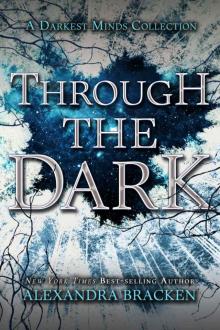 Through the Dark (A Darkest Minds Collection) (A Darkest Minds Novel)
Through the Dark (A Darkest Minds Collection) (A Darkest Minds Novel)